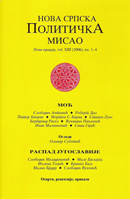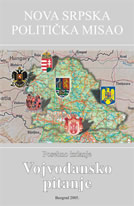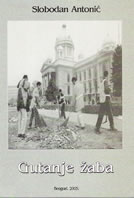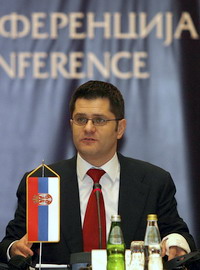| NSPM in English | |||
Our Kosovo policy will not change |
 |
 |
 |
| četvrtak, 06. januar 2011. | |
|
Respected Dean of the Diplomatic Corps, Excellencies, Ladies and Gentlemen, It is my distinct pleasure to greet you all to the fourth Ambassadors’ Conference of the Serbian Ministry of Foreign Affairs. To our distinguished guest from the Slovak Republic, my dear friend Mikuláš, a very warm welcome. I’m so glad that the very architect of that country’s ‘Serbia Policy’ is here with us today. I want to make use of this opportunity to say how profoundly grateful we are to Slovakia for its unwavering support on all fronts. I would also like to extend a heartfelt welcome to the diplomatic corps. I look forward to engaging with you further in 2011, as we work to deepen our relationships around the world on the basis of mutual interest and respect. Lastly, to the ambassadors of the Republic of Serbia abroad, and to our Belgrade-based diplomats—I extend a message of sincere appreciation. I wholeheartedly thank you for your continuing sacrifice and hard work. Excellencies, This year will mark the 200th anniversary of the establishment of the Serbian diplomatic service: in 1811, the leader of our First Uprising, Karadjordje, appointed Serbia’s inaugural Councilor—or popečitelj—for foreign affairs. A little over a year later, the Uprising gained international legitimacy for the first time. Our diplomats were involved in the talks resulting in the 1812 Treaty of Bucharest, which opened the door for the return of our nation to the European mainstream. After Serbia was again recognized as a fully sovereign state at the Congress of Berlin, national architects in the tradition of Jovan Ristić and Stojan Novaković led the way in deepening Serbia’s relations with the European capitals. Then came the great victory of the First World War, for which our nation paid so much in blood and treasure. Diplomats such as Jovan Dučić and Ivo Andrić worked hard to strengthen the foundations of the nascent South Slavic state. The defeat of fascism in the Second World War, which came at horrendous cost to the Serbian people, heralded the beginning of the golden age of our diplomacy. Thanks in large part to the dedicated efforts of Koča Popović—as well as his two most notable successors, Marko Nikezić and Mirko Tepavac—we prudently positioned ourselves in 1945 so as to benefit from the geostrategic changes brought on by the birth of a new era. It produced great advantages for our country, as we played a disproportionately prominent role on the global stage throughout much of the Cold War. As it came to an end, so did our high standing in the world. The fall of the Berlin Wall in 1989 came to symbolize the start of another new era in global politics. But throughout the Balkans, 1989 represented first and foremost a missed opportunity, leading to a great tragedy. In 1945, the international circumstances were properly assessed, and right choices were made. In 1989, one the other hand, the circumstances were misjudged, and wrong choices were made. In both instances, the consequences of our actions were deeply felt by the entire nation for years to come. Excellencies, Today, the world faces another time of great transformation—a global paradigm shift in many ways comparable to 1945 and 1989. We are working very hard to avoid repeating the basic mistake of 1989, namely to think one can ignore fundamental changes in international politics without consequence. Just as when the tectonic plates shifted on previous occasions, a successful foreign policy in our era will again depend on the ability to accommodate change. Such an approach must take special care to avoid adversarial resistance, which is both futile and dangerous—but also fatalistic surrender, which is tantamount to relinquishing control over one’s own national interests. Yet the exact nature, depth and scope of the change are difficult to grasp. For decades, there was one great dividing line, and it ran through the center of the Old Continent. Then, for a few years, many came under the impression that there would be no lines any longer. Today, it appears that we are entering a time where we will witness a proliferation of them. Across-the-board repositioning is taking place, as norms shift and rules get re-defined. What we are seeing is not just another generational reshuffling of the deck, but a drastic—and seemingly instantaneous—increase in the number of both cards and players. This is happening in an environment in which complex challenges require input from established and arriving actors alike. The first-tier issues of our time have all become global in their essence—from energy security, economic instability and climate change, to nuclear safety, terrorism and organized crime. Each one of them will require a multilateral approach. Yet our existing multilateral institutions are no longer aligned with the actual distribution of power and influence. Excellencies, Under such circumstances, diplomacy has become more difficult to practice effectively. In straining times when pressure builds, some people begin to believe that the only safe course of action is to tactically retreat—so as to be better able to respond to events that one cannot influence anyway. This may have been sustainable in the past, but not today. In the 21st century, isolation creates ample space for others to impose themselves on an inertial actor. Passivity limits options, while constraining their execution in ways that harm national interests. It relegates the country in question to being a mere object of the international system, instead of a valued participant in its transformation. One thing is certain: he who does not step forward to engage with the events as they unfold will be trounced. Yet even he who does—who seeks to be an active participant—cannot take success for granted, if all he aims to do is to preserve the old ways. By trying to risk too little, one would in fact be risking too much. The present circumstances dictate, therefore, that only a well-planned and carefully executed, vigorous foreign policy can contribute to a country’s advancement in the global arena. Excellencies, Despite the complexity of the situation, we remain confident that President Boris Tadić’s foreign policy vision will enable us to emerge from this inter-polar moment in a more advantageous position than the one we were in when the tumults began. Serbia’s foreign policy in 2011, therefore, will be one of continuity. We will maintain our four basic priorities: one, working towards membership in the European Union; two, continuing to peacefully defend our constitutional order; three, consolidating regional stability and cooperation; and four, deepening our economic relationships across the globe. Serbia will keep implementing these four priorities by enhancing bilateral ties throughout the world, which from our perspective is held up by four main pillars: Brussels, Moscow, Beijing, and Washington. Excellencies, Serbia’s central strategic priority remains Europe. We have stayed this course under very difficult circumstances. On January 31st, the Government will submit the completed questionnaire to the European Commission. During this year, Serbian diplomacy will focus its efforts on making sure three very important things occur: the ratification of the SAA by EU members that have not yet done so; the extension of official candidate status; and the announcement of a date for the beginning of accession talks. Excellencies, In the wake of the eurozone crisis, it has become difficult not to notice that the level of anxiety in many of the EU’s member states has risen. As a result, even some of the Union’s most successful policies are being questioned, such as enlargement. Understandably, this has raised the level of concern in many quarters. But it has not affected Serbia’s determination. For us, ‘Europe’ is not exclusively about membership in the Union; it is first and foremost about building a European society. One of its central components is justice—which includes making sure that individuals who committed war crimes are held accountable, irrespective of their ethnicity or their current occupation. We will continue to fully cooperate with the Hague Tribunal. But equally, we will demand a prompt, thorough and impartial criminal investigation regarding the serious allegations that are contained in the Council of Europe Parliamentary Assembly report, prepared by Senator Dick Marty of Switzerland, entitled “Inhuman Treatment of People and Illicit Trafficking in Human Organs in Kosovo.” ___ Building a European society is also about modernization and standards. We must reinvigorate the spirit of reform that sees responsibility, transparency, and accountability as indispensable to the long-term health of the nation. Serbia will be a European society when it becomes possible to answer at least three basic questions in the affirmative. First, is this a country where the rule of law reigns supreme? Second, do we have the capacity for sustainable economic development? And third, can our public administration and judiciary effectively implement legislation and protect the rights of our citizens? We will become a European society when the money made by big business stays in Serbia, and monopolies are regulated out of existence; when corruption in hospitals and courtrooms, schools and municipalities is no longer part of our reality; when our infrastructure meets 21st-century specifications. Serbia will become a European society when everyone who wants to work can find a job that pays enough; when small- and medium-sized business owners can compete in the marketplace without having to cut corners; and when we start to produce and export goods that can fetch premium prices abroad. Irrespective of the actual accession date, building a European society is the way for our country to prosper in peace and security, and to put our own house in order, once and for all. Excellencies, Another important foreign policy priority will be to carry on with diplomatic efforts to uphold our constitutional order. In 2010, we worked very hard to contain the effects of UDI—the unilateral declaration of independence by the ethnic-Albanian authorities of our southern province of Kosovo and Metohija. In 2011, Serbia’s principled position on UDI will remain the same. We will not recognize UDI, implicitly or explicitly. This is enshrined in our constitution, and is the product of a de facto public consensus—driven by a firm electoral majority. Our Kosovo policy will continue to emphasize the necessity for reaching a strategic compromise. Diplomacy will keep standing at the forefront of our efforts to manage political differences. We will have two main Kosovo-related tasks in 2011. The first centers on ensuring the number of UDI recognitions is contained, and that the authorities in Pristina are not unilaterally admitted into international organizations whose membership is the sole prerogative of sovereign states. Before I proceed any further, allow me to extend a heartfelt acknowledgment of gratitude to the representatives of the vast majority of UN member States that honor Serbia’s territorial integrity, and are helping us to fulfill the aforementioned task. ____ Last year, in the wake of the International Court of Justice’s status-neutral advisory opinion, the world supported by acclamation the fact that dialogue is the only road to peace in Kosovo. Our second Kosovo-related task will be to help maintain a healthy international environment within which this dialogue can take place. It is critical that no impediments are placed on the road the stakeholders have agreed to take, and that the dialogue begins as soon as possible. Everyone must stay committed to engage in good-faith—for in the 21st century, win-win solutions are impossible to reach with zero-sum attitudes. Accordingly, any attempts to derail the dialogue by altering realities on the ground unilaterally—or by having recourse to the use of force—must not be tolerated. This includes trying to extend the reach of the Pristina-based institutions to North Kosovo against the will of the local population. Should anything like this happen, the peace process may be dramatically, perhaps even fatally, undermined. ___ No one should doubt our readiness to be constructive in working to forge a transformative peace between Serbs and Albanians. A frozen conflict is not our aim. In 2011, we shall continue to work incessantly on creating the conditions for forging a comprehensive settlement on Kosovo acceptable to all parties. Excellencies, I come to our third core foreign policy priority: the consolidation of stability and cooperation in the Balkans. Let me begin by acknowledging the new level of trust and understanding that has taken hold of the region. I believe we should celebrate the fact that relations have never been better. I also believe that in the years to come, regional cooperation will increasingly provide the most appropriate framework for how the remaining challenges we face in the Western Balkans can be overcome. As a reminder of how rapidly things can progress, consider that not too long ago, Serbia was itself widely perceived to be the outstanding issue in this part of the world. This is no longer the case. Serbia has gone from being an issue to being an actor—an indispensable part of the answer to a number of regional questions. One of these is reconciliation. In 2010, great strides were made in this regard. President Boris Tadić led by example. A few months ago, he traveled to Vukovar in Croatia—as he did to Srebrenica on the 15th anniversary of the massacre. The President’s efforts were also instrumental in ensuring that our National Assembly passed a historic Declaration on Srebrenica. The crime was unequivocally condemned, while condolences and apologies were extended. This act of parliament was unprecedented—not only for the Western Balkans, but for all of Europe, a continent whose long and bloody history has recorded many events requiring contrition. Moreover, as a responsible stakeholder in Bosnia’s future, we will continue to exercise our influence in a constructive way. We firmly believe that representatives of both entities and all three constituent peoples need to reach a consensus in order to ensure legitimacy and sustainability. This will require mutual respect, pragmatism and compromise. ____ In 2011, Belgrade will be—symbolically speaking—the capital of regional cooperation. This year, we hope to lead the way in bringing our neighbors even closer together, as we assume the presidencies of three key regional organizations—the Central European Initiative, the Adriatic-Ionian Initiative, and the Southeast European Cooperation Process. A common theme driving our chairmanship activities will be fighting organized crime—one of the darker sides of globalization. We have declared total war on this transnational scourge. We have made it abundantly clear that we shall spare no effort to eliminate this threat to our security. However, ultimate success cannot come without a much stronger and more coordinated effort by the entire region, for organized crime is like water: it spreads to where it finds least resistance. One such place is Kosovo, which remains an organized crime safe-haven. Belgrade, for its part, will do whatever it takes; we will stay the course until this war is won. Excellencies, The final foreign policy priority for 2011 is economic diplomacy. Serbia will enhance its efforts to deepen existing economic relationships and create new ones, across the globe. This is a natural extension of the world-wide political outreach we launched more than three years ago. Our future prosperity hinges in large part on how we make better use of bilateral and regional free trade agreements, promote our FDI potential, and gain access to emerging and growing markets. In today’s world, capital flows less freely. The impediments are not simply regulatory in nature. More and more, political relations are driving economic decision-making in the contemporary international arena. The role of diplomats is becoming increasingly important, as they move to the frontline of economic activity. The distinct contributions of politics, economics and diplomacy is merging into a single meta-discipline. ____ A number of countries with which we shall deepen our engagement are members of the Non-Aligned Movement. As an old friend and an observer state to NAM, we believe that increasing our levels of trade and investment can be beneficial to everybody.
But this is not the only reason why Serbia seeks to re-invigorate its ties to NAM countries. It is also because we believe international stability and prosperity cannot be consolidated without taking into account the views of the majority of the global family of nations. My country remains distinctly proud of the role it played in the history of NAM. Belgrade played host to its First Summit in 1961. I am honored to be able to confirm that Egypt, the Movement’s current chairman, will preside—in Belgrade—over a special meeting in the first half of September to celebrate the 50th anniversary of its founding. Excellencies, Over the past few years, our country has weathered enormous international challenges against incredible odds. We will keep trying to accommodate the global changes in ways that serve our national interests—so that we emerge from the present inter-polar moment in a more advantageous position than the one the country was in when the tumults began. We still have a long way to go. It will take the hard work of a generation before we fulfill our declared goals. Yet this should not distract us from doing our duty—for otherwise, we run the colossalrisk of falling further behind. We have to make sure that we stay the course. Our task is to build a European society, and end the era of discontent in the Balkans. We must make sure that outstanding problems such as Kosovo and Bosnia are resolved consensually. And, finally, we must continue building up active relationships with all the countries upon which the future prosperity of our nation depends. Thank you very much. |
Od istog autora
- Iz arhive - Remarks Before the Foreign Affairs Committee of the European Parliament
- From Balkan Wars to Balkan Peace
- Serbia is dedicated to solving all differences at the negotiating table
- 2009 was Serbia’s best EU accession year ever
- We will never recognize UDI
- Kosovo is without a doubt the darkest corner of Europe
- Serbia, the United States, and the Riddle of Europe
- Serbia will be a bridge between the European Union and the African Union
- Kosovo is our Jerusalem
- Minister of Foreign Affairs Vuk Jeremic’s Speech at the UN SC
- Address Before the Second Serbian Ambassadors’ Conference
- One Nation, Indivisible
Ostali članci u rubrici
- Playing With Fire in Ukraine
- Kosovo as a res extra commercium and the alchemy of colonization
- The Balkans XX years after NATO aggression: the case of the Republic of Srpska – past, present and future
- Iz arhive - Remarks Before the Foreign Affairs Committee of the European Parliament
- Dysfunction in the Balkans - Can the Post-Yugoslav Settlement Survive?
- Serbia’s latest would-be savior is a modernizer, a strongman - or both
- Why the Ukraine Crisis Is the West’s Fault
- The Ghosts of World War I Circle over Ukraine
- Nato's action plan in Ukraine is right out of Dr Strangelove
- Why Yanukovych Said No to Europe

.jpg)








 Dear Foreign Minister Dzurinda,
Dear Foreign Minister Dzurinda,













